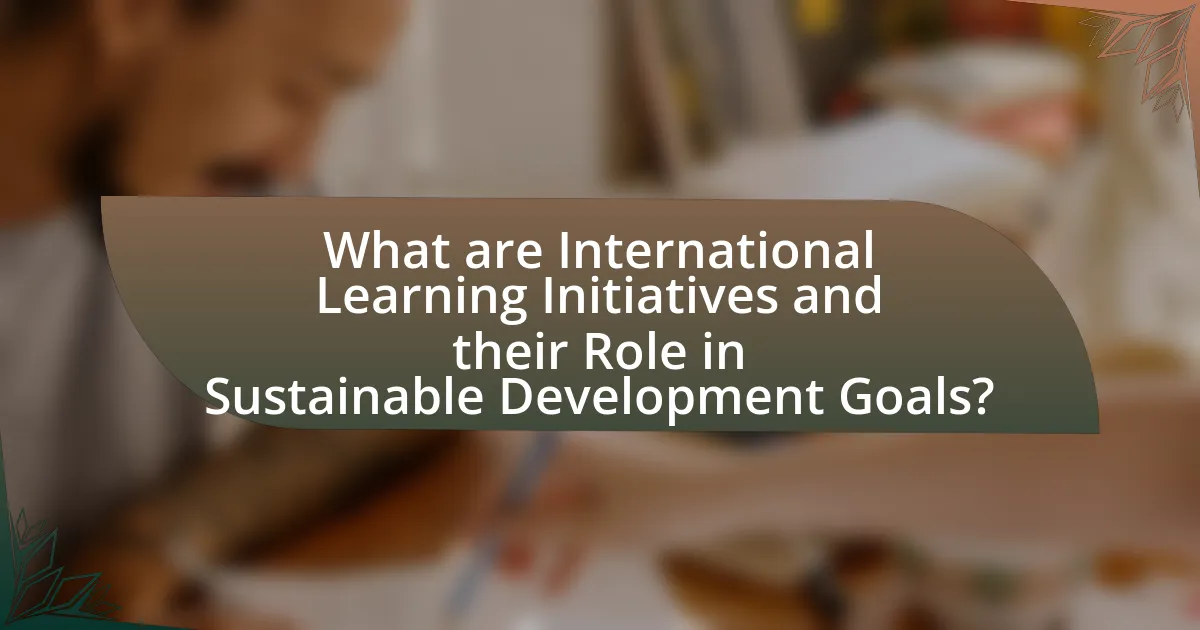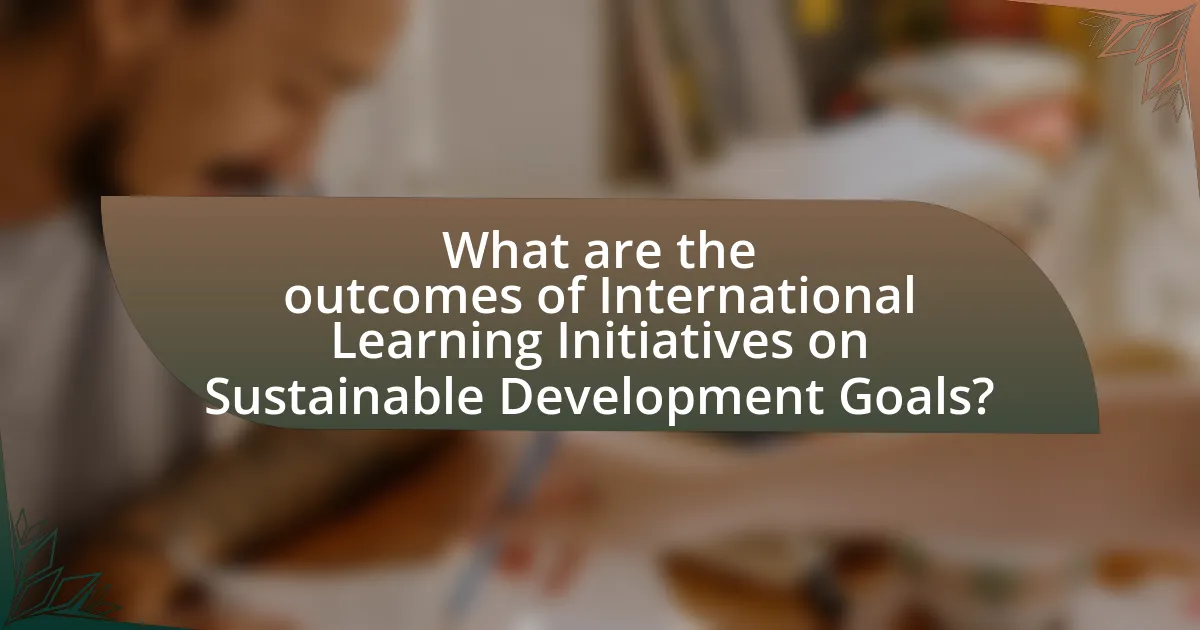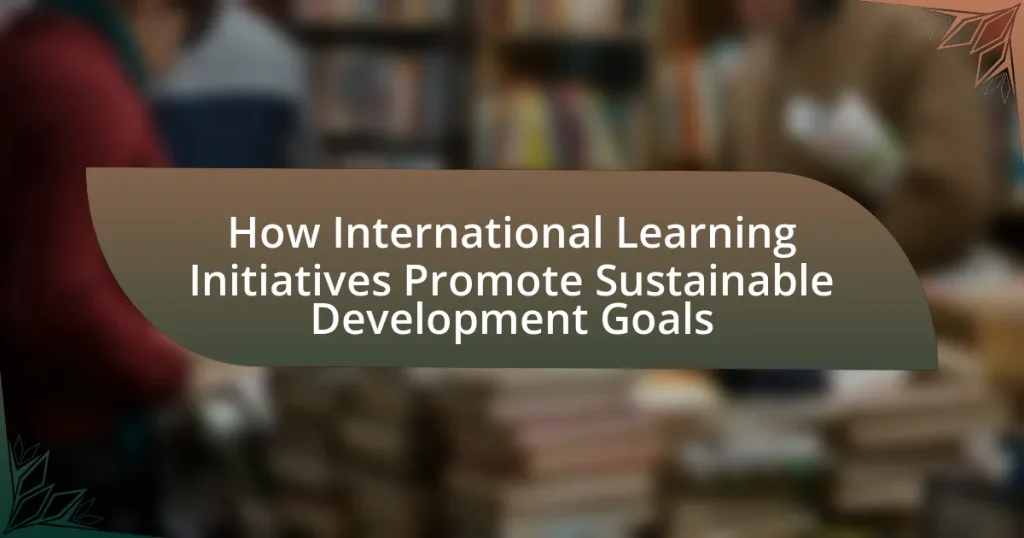International Learning Initiatives are collaborative programs that enhance education and knowledge sharing across borders, playing a vital role in achieving Sustainable Development Goals (SDGs). These initiatives facilitate the exchange of best practices and resources, addressing global challenges such as poverty, inequality, and climate change. Key SDGs targeted include Quality Education, Climate Action, and Partnerships for the Goals, with a focus on improving educational access and quality. The article explores how these initiatives foster global collaboration, enhance capacity building, and influence policy changes, while also highlighting successful case studies and best practices for sustaining long-term impact.

What are International Learning Initiatives and their Role in Sustainable Development Goals?
International Learning Initiatives are collaborative programs designed to enhance education and knowledge sharing across borders, significantly contributing to the achievement of Sustainable Development Goals (SDGs). These initiatives facilitate the exchange of best practices, resources, and innovative solutions among countries, thereby addressing global challenges such as poverty, inequality, and climate change. For instance, the Global Partnership for Education mobilizes funding and expertise to improve education systems in developing countries, directly supporting SDG 4, which aims to ensure inclusive and equitable quality education. Additionally, initiatives like the United Nations Educational, Scientific and Cultural Organization (UNESCO) promote lifelong learning opportunities, aligning with multiple SDGs by fostering sustainable development through education.
How do International Learning Initiatives contribute to Sustainable Development Goals?
International Learning Initiatives contribute to Sustainable Development Goals by fostering global collaboration, knowledge sharing, and capacity building among diverse stakeholders. These initiatives enhance educational access and quality, directly impacting Goal 4, which aims to ensure inclusive and equitable quality education. For instance, programs like the Global Partnership for Education mobilize resources and expertise to improve learning outcomes in developing countries, demonstrating a measurable increase in school enrollment rates and literacy levels. Additionally, initiatives that promote sustainable practices in education align with Goals 12 and 13, addressing responsible consumption and climate action through curriculum development and community engagement.
What specific Sustainable Development Goals are addressed by these initiatives?
The specific Sustainable Development Goals addressed by these initiatives include Goal 4: Quality Education, Goal 13: Climate Action, and Goal 17: Partnerships for the Goals. These goals are targeted through educational programs that enhance learning opportunities, promote environmental sustainability, and foster global partnerships for development. For instance, initiatives that focus on improving educational access directly contribute to Goal 4, while those that incorporate climate education and action plans support Goal 13. Additionally, collaborative projects between countries and organizations exemplify the essence of Goal 17 by strengthening partnerships to achieve sustainable development.
How do these initiatives foster global collaboration for sustainable development?
These initiatives foster global collaboration for sustainable development by creating platforms for knowledge sharing, resource mobilization, and joint problem-solving among diverse stakeholders. For instance, programs like the United Nations Sustainable Development Solutions Network facilitate partnerships between governments, academia, and civil society, enabling the exchange of best practices and innovative solutions. Additionally, initiatives such as the Global Partnership for Education mobilize funding and expertise from multiple countries to improve educational outcomes, which is essential for achieving sustainable development goals. This collaborative approach is evidenced by the increased participation of over 100 countries in global forums, demonstrating a collective commitment to addressing challenges like climate change and poverty through shared learning and cooperative action.
Why are International Learning Initiatives important for achieving Sustainable Development Goals?
International Learning Initiatives are crucial for achieving Sustainable Development Goals (SDGs) because they foster collaboration, knowledge sharing, and capacity building among countries. These initiatives enable nations to learn from each other’s successes and challenges, facilitating the adoption of best practices that can accelerate progress towards the SDGs. For instance, the United Nations Educational, Scientific and Cultural Organization (UNESCO) emphasizes that international cooperation in education can enhance the quality of learning and promote inclusive and equitable education, which directly supports SDG 4. Furthermore, research shows that countries engaged in international learning initiatives are more likely to meet their SDG targets due to improved policy frameworks and resource mobilization strategies.
What challenges do these initiatives help to overcome in sustainable development?
International learning initiatives help to overcome challenges such as lack of awareness, insufficient capacity building, and inadequate collaboration in sustainable development. These initiatives raise awareness by disseminating knowledge about sustainable practices and their importance, thereby fostering a culture of sustainability. They enhance capacity building by providing training and resources to individuals and organizations, enabling them to implement sustainable solutions effectively. Furthermore, these initiatives promote collaboration among stakeholders, including governments, NGOs, and communities, which is essential for addressing complex sustainability issues. For example, the United Nations’ Sustainable Development Solutions Network facilitates knowledge sharing and partnerships, directly addressing the challenge of fragmented efforts in achieving the Sustainable Development Goals.
How do they enhance knowledge sharing and capacity building?
International learning initiatives enhance knowledge sharing and capacity building by facilitating collaborative platforms that connect diverse stakeholders, including governments, NGOs, and communities. These initiatives often employ workshops, online courses, and knowledge exchange programs to disseminate best practices and innovative solutions. For example, the United Nations Development Programme (UNDP) has implemented various learning initiatives that promote the sharing of successful strategies in sustainable development, leading to improved local capacities and informed decision-making. Such structured approaches not only increase access to vital information but also empower participants to apply new skills and knowledge effectively in their contexts.

What are the key components of successful International Learning Initiatives?
Successful International Learning Initiatives are characterized by collaboration, cultural exchange, and adaptability. Collaboration among diverse stakeholders, including educational institutions, governments, and NGOs, fosters shared goals and resources, enhancing the initiative’s impact. Cultural exchange enriches the learning experience, allowing participants to gain different perspectives and insights, which is essential for addressing global challenges. Adaptability ensures that initiatives can respond to changing circumstances and the specific needs of communities, making them more effective. For instance, the United Nations Educational, Scientific and Cultural Organization (UNESCO) emphasizes that initiatives aligned with local contexts and needs are more likely to succeed in promoting sustainable development goals.
How do partnerships enhance the effectiveness of these initiatives?
Partnerships enhance the effectiveness of international learning initiatives by leveraging diverse resources, expertise, and networks to achieve common goals. Collaborative efforts among governments, NGOs, and private sectors facilitate knowledge sharing and innovation, which are crucial for addressing complex challenges related to sustainable development. For instance, the United Nations’ Sustainable Development Goals (SDGs) emphasize the importance of multi-stakeholder partnerships, as evidenced by the Global Partnership for Education, which mobilizes funding and expertise to improve education systems in developing countries. This collaborative approach not only amplifies impact but also fosters accountability and sustainability in initiatives aimed at achieving the SDGs.
What roles do governments, NGOs, and educational institutions play?
Governments, NGOs, and educational institutions play crucial roles in promoting sustainable development goals through policy-making, advocacy, and education. Governments establish frameworks and regulations that guide sustainable practices, allocate funding for initiatives, and create partnerships to enhance resource mobilization. For instance, the United Nations’ 2030 Agenda for Sustainable Development, adopted by all UN member states, emphasizes the importance of government involvement in achieving these goals.
NGOs act as intermediaries that implement projects, raise awareness, and advocate for marginalized communities, often filling gaps left by governmental efforts. They mobilize resources and expertise to address specific issues, such as environmental conservation and social equity, which are integral to sustainable development. For example, organizations like Greenpeace and Oxfam have been pivotal in driving grassroots movements and influencing policy changes.
Educational institutions contribute by integrating sustainability into curricula, conducting research, and fostering critical thinking among students. They prepare future leaders to tackle global challenges by promoting interdisciplinary approaches to sustainability. Research from the Global Education Monitoring Report indicates that education is essential for achieving all 17 Sustainable Development Goals, highlighting the interconnectedness of education and sustainable development.
How can technology be leveraged to improve these initiatives?
Technology can be leveraged to improve international learning initiatives promoting sustainable development goals by enhancing accessibility, facilitating collaboration, and providing data-driven insights. For instance, online learning platforms enable participants from diverse geographical locations to access educational resources, thereby increasing inclusivity. Collaborative tools like video conferencing and shared digital workspaces allow for real-time interaction and knowledge exchange among learners and educators worldwide. Additionally, data analytics can track progress and outcomes, enabling organizations to refine their strategies based on measurable results, as evidenced by studies showing that data-informed decision-making can lead to a 20% increase in program effectiveness.
What methodologies are commonly used in International Learning Initiatives?
Common methodologies used in International Learning Initiatives include collaborative learning, experiential learning, and project-based learning. Collaborative learning fosters teamwork and cross-cultural communication, essential for addressing global challenges. Experiential learning emphasizes hands-on experiences, allowing participants to engage directly with communities and environments, which enhances understanding and retention of knowledge. Project-based learning focuses on real-world problems, encouraging participants to develop solutions that align with Sustainable Development Goals, thereby promoting practical application of skills and knowledge. These methodologies are supported by research indicating their effectiveness in enhancing engagement and learning outcomes in diverse international contexts.
How do experiential learning and community engagement contribute to success?
Experiential learning and community engagement significantly contribute to success by enhancing practical skills and fostering social responsibility. Experiential learning allows individuals to apply theoretical knowledge in real-world contexts, leading to improved problem-solving abilities and critical thinking skills. For instance, studies show that students engaged in experiential learning programs demonstrate higher retention rates and better academic performance compared to traditional learning methods. Community engagement, on the other hand, cultivates a sense of belonging and accountability, encouraging individuals to work collaboratively towards common goals. Research indicates that community involvement can lead to increased civic participation and improved social networks, which are essential for sustainable development. Together, these approaches not only prepare individuals for professional success but also promote the achievement of Sustainable Development Goals by addressing local needs and fostering inclusive growth.
What assessment tools are used to measure the impact of these initiatives?
Assessment tools used to measure the impact of international learning initiatives promoting sustainable development goals include surveys, interviews, focus groups, and performance metrics. Surveys quantitatively assess participant knowledge and attitudes before and after initiatives, while interviews and focus groups provide qualitative insights into participant experiences and perceived changes. Performance metrics, such as completion rates and skill acquisition assessments, offer concrete data on the effectiveness of the initiatives. These tools collectively enable a comprehensive evaluation of the initiatives’ impact on achieving sustainable development goals.

What are the outcomes of International Learning Initiatives on Sustainable Development Goals?
International Learning Initiatives significantly enhance the achievement of Sustainable Development Goals (SDGs) by fostering knowledge sharing, capacity building, and collaborative problem-solving among diverse stakeholders. These initiatives facilitate the exchange of best practices and innovative solutions, which are crucial for addressing complex global challenges such as poverty, inequality, and climate change. For instance, programs like the Global Learning and Observations to Benefit the Environment (GLOBE) have engaged students and educators worldwide in environmental monitoring, directly contributing to SDG 13 (Climate Action) by promoting awareness and action on climate issues. Furthermore, research indicates that such initiatives improve educational outcomes and empower communities, thereby supporting SDG 4 (Quality Education) and SDG 10 (Reduced Inequalities).
How do these initiatives lead to measurable progress in sustainability?
International learning initiatives lead to measurable progress in sustainability by fostering collaboration, knowledge sharing, and capacity building among diverse stakeholders. These initiatives create frameworks for best practices, enabling countries to implement sustainable development strategies effectively. For example, the United Nations’ Sustainable Development Solutions Network reports that countries participating in international learning programs have seen a 20% increase in the adoption of renewable energy technologies. This quantifiable improvement demonstrates how structured learning environments can drive tangible advancements in sustainability efforts.
What case studies illustrate successful outcomes from these initiatives?
Case studies illustrating successful outcomes from international learning initiatives promoting sustainable development goals include the “Global Learning for Sustainability” project in Kenya, which improved agricultural practices among local farmers, resulting in a 30% increase in crop yields. Another example is the “Youth Empowerment through Education” program in Brazil, which led to a 40% reduction in school dropout rates by providing vocational training and mentorship. These initiatives demonstrate the effectiveness of targeted educational programs in achieving specific sustainable development outcomes.
How do they influence policy changes at local and global levels?
International learning initiatives influence policy changes at local and global levels by fostering collaboration, sharing best practices, and providing evidence-based recommendations. These initiatives, such as the United Nations’ Sustainable Development Solutions Network, facilitate knowledge exchange among countries, enabling policymakers to adopt successful strategies tailored to their specific contexts. For instance, the Global Partnership for Education has successfully mobilized resources and influenced educational policies in over 60 countries by demonstrating the impact of quality education on economic growth and social equity. This evidence-based approach encourages local governments to align their policies with global sustainability goals, ultimately driving systemic change.
What best practices can be adopted for effective International Learning Initiatives?
Effective International Learning Initiatives can be achieved by fostering collaboration among diverse stakeholders, including educational institutions, governments, and local communities. This collaboration enhances resource sharing and knowledge exchange, which are critical for addressing global challenges. For instance, the United Nations Educational, Scientific and Cultural Organization (UNESCO) emphasizes the importance of partnerships in its Global Education Monitoring Report, highlighting that collaborative efforts can lead to innovative solutions that align with Sustainable Development Goals (SDGs). Additionally, integrating local contexts into the curriculum ensures relevance and engagement, as evidenced by programs that adapt global learning frameworks to local needs, thereby increasing participation and impact.
How can stakeholders ensure inclusivity and accessibility in these initiatives?
Stakeholders can ensure inclusivity and accessibility in international learning initiatives by implementing comprehensive strategies that address diverse needs. This includes conducting needs assessments to identify barriers faced by underrepresented groups, such as individuals with disabilities or those from marginalized communities. Research indicates that initiatives designed with input from these groups are more effective; for example, the World Bank’s 2020 report highlights that inclusive education practices improve learning outcomes for all students. Additionally, stakeholders should provide resources in multiple formats and languages, ensuring that materials are accessible to everyone. By fostering partnerships with local organizations that specialize in inclusivity, stakeholders can enhance outreach and engagement, thereby promoting equitable access to learning opportunities.
What strategies can be implemented to sustain long-term impact?
To sustain long-term impact, organizations should implement strategies such as continuous stakeholder engagement, adaptive learning, and robust monitoring and evaluation systems. Continuous stakeholder engagement ensures that the needs and perspectives of all parties are considered, fostering ownership and commitment to initiatives. Adaptive learning allows organizations to adjust their strategies based on feedback and changing circumstances, enhancing relevance and effectiveness. Robust monitoring and evaluation systems provide data-driven insights that inform decision-making and demonstrate accountability, which is essential for securing ongoing support and resources. These strategies are supported by evidence from various international development projects that highlight the importance of stakeholder involvement and data-driven approaches in achieving sustainable outcomes.
